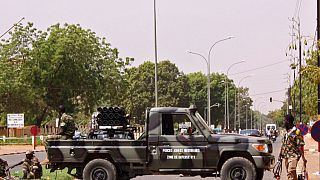Nigeria
Jihadi fighters who had long operated in Africa's volatile Sahel region have settled in northwestern Nigeria after crossing from neighbouring Benin, a new report said Wednesday, the latest trend in the militants' movements to wealthier West African coastal nations.
The extremists believed to be linked to al-Qaida have in the last year crossed over from Benin's hard-hit northern region and settled in the Kainji Lake National Park, one of Nigeria's largest which had been under security threats, according to the report by the Clingendael Institute think tank.
Residents close to the park told The Associated Press that the facility, which holds one of West Africa's fast-declining lion populations, has been closed for more than a year because of security threats from armed groups attacking neighbouring villages and roads.
"Before, it was like a tourism centre (but) now, people find it difficult to pass through there," said John Yerima who lives near the park in New Bussa town. "You cannot enter that road (leading to the park) now. It is dangerous seriously."
Escalating Security Situation
The security situation at the 5,300-square-kilometer (2,000-square-mile) park in Niger state and along the nearby border with Benin is "getting out of hand" and is "a much more explosive situation than we had anticipated," said Kars de Bruijne, one of the authors of the report and senior research fellow at the institute.
The "sustained presence" of the armed groups in the park is the first sign of a connection between the Islamic State group-backed extremists in their decade-long insurgency in northern Nigeria, and al-Qaida-linked militants from the Sahel, the vast arid expanse south of the Sahara Desert, Bruijne said.
Their presence offers an opportunity for the extremists "to claim large-scale success" in both countries already wracked by deadly attacks in recent years, he added.
Worsening Security in the Sahel
Known as the global hot spot for violent extremism, the Sahel region's worsening security crisis comes just as military coups are toppling democratic governments. As the military governments struggle to contain the violence, they are increasingly severing security with traditional partners France and the United States, and turning to Russia for support.
In northwest Nigeria, security analysts have in the past warned that the region's remote territories — where the government is largely absent but has rich mineral resources and high poverty levels — present an opportunity for expansion for jihadi groups that had operated mainly in the Sahel as well as IS, whose fighters holds sway in the Lake Chad basin.
"A link between Lake Chad and the Sahel is a major opportunity for al-Qaida and the Islamic State to boast about their profiles as leaders of global jihad," the report said.
Conservation Concerns
There were also concerns from conservationists warned that the presence of armed groups in the park could further threaten the remaining lions whose populations have declined as a result of climate change and poaching.
"The security situation has become top of the list when it comes to the concerns about the lion populations in Nigeria," said Stella Egbe, senior conservation manager at the Nigerian Conservation Foundation.
Uncertain Motives of Sahel Extremists
The Clingendael report said that it's unclear the motive of the Sahel extremists in the park or what their relationship with other armed groups there would be. Security analysts say it offers opportunities for logistics and more influence amid a booming illegal trade across the porous border.
"The Sahelian jihadis potentially can try to use northwestern Nigeria as a place for fundraising for logistics and to try to influence the jihadi groups there as part of their own competition, said James Barnett, a fellow at Hudson Institute whose works in northwestern Nigeria were cited in the report.
Across many villages in Nigeria's northwest, banditry — not jihadi fighters — remains the major security threat, Barnett said.
The bandits have on one or two occasions in the past collaborated with jihadi fighters as two separate groups in carrying out attacks. But even in such a rare collaboration, he said, there can be "very deadly consequences."













Go to video
Benin says 54 soldiers killed in Islamic militant attack
00:47
Ghana: President Mahama suspends Chief Justice Gertrude Torkornoo
Go to video
Police rescue 33 West Africans from a human trafficking scam in Ivory Coast
Go to video
Pope Francis' funeral scheduled Saturday April 26
Go to video
Al-Qaida-linked militants attack a strategic town in Somalia
Go to video
Trump administration threatens Harvard over foreign student visas and protest ties